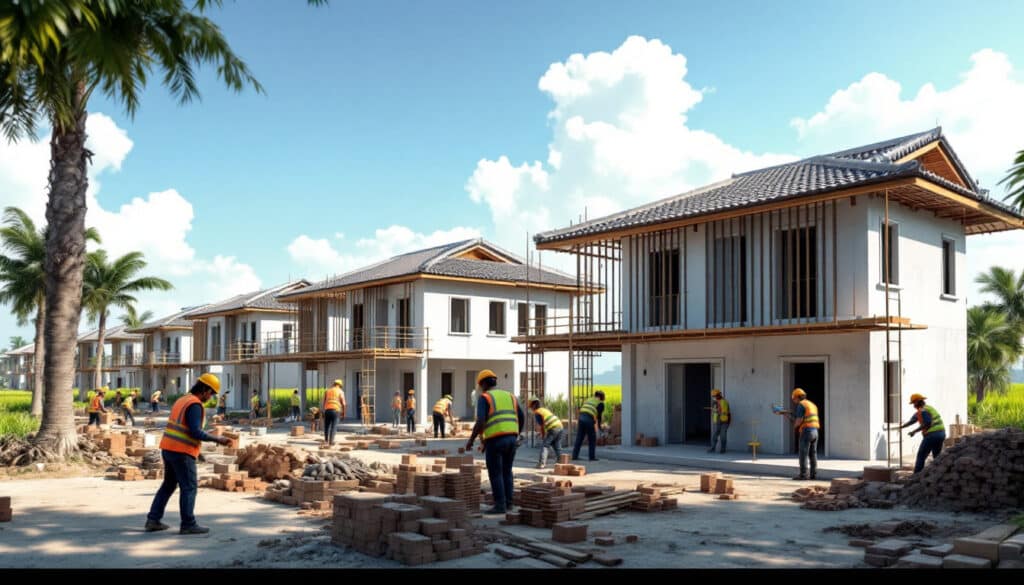In a constantly evolving universe, PropTech presents itself as a real breath of fresh air for the real estate sector. The merger of the technology and the property redefines market standards, offering ever more innovative and efficient solutions. By changing the way we buy, sell and manage our properties, this digital revolution is completely reshaping our relationship with real estate.
There digital transformation driven by PropTech encompasses a multitude of tools and technologies, ranging from IoT sensors to applications based onartificial intelligence. It thus allows players in the sector to better understand and anticipate market fluctuations. Thanks to this development, property owners and managers have the ability to monitor the energy performance of buildings in real time, facilitate transactions with the electronic signature, and even optimize their sales strategies. In short, PropTech is not just a passing phenomenon, but one of the pillars ofreal estate of tomorrow, which adapts to the demands of an increasingly connected world.

There PropTech represents one of the most exciting developments in the real estate sector, merging traditional real estate with technological advancements. At a time when the digitalization of many areas is a necessity, PropTech responds to an urgent need for transformation within a constantly evolving market. This evolution is not simply limited to the implementation of new technologies; it is also about the reinvention of processes, services and interactions in the real estate market.
Table of Contents
ToggleA Digital Revolution in Progress
At the heart of this dynamic, PropTech embodies a digital revolution that affects all aspects of real estate activities. Rethinking business models, it provides solutions that make real estate transactions more transparent, efficient and accessible. The merger of the terms “property” and “technology” demonstrates the growing interconnection between these two fields. From rental management platforms to digital marketing tools, everything is redesigned to adapt to the expectations of modern consumers.
Recent innovations, such as management systems based on BIM (building information modeling) or sensors IoT (Internet of Things), allow owners and managers to analyze and monitor the energy performance of buildings in real time. Thanks to these technologies, not only does energy efficiency improve, but it also contributes to better resource management.
Avec 3 500 start-up Proptech, “l’Europe se targue de l’écosystème de start-up le plus large au monde mais aussi le plus fragmenté” https://t.co/JApdTyUQBi
— La Libre (@lalibrebe) May 29, 2024
Technologies at the Service of Real Estate
PropTech integrates various technological aspects, including the use of massive data and theArtificial intelligence. These tools play a crucial role in identifying real estate market trends and optimizing business strategies. Thanks to Big Data, industry players can analyze a considerable amount of information to support them in their strategic choices. For example, companies can predict market fluctuations, better understand consumer behavior, and adjust their offers accordingly.
Digital transformation also delivers significant cost-effectiveness benefits. There electronic signature, by simplifying transaction processes, allows unprecedented fluidity in the execution of contracts. It has become a cornerstone of many real estate developers’ strategy, reducing document processing time and the need for physical travel.
At the same time, new business models are emerging. Traditional real estate agencies are adopting digital platforms that allow them to collaborate effectively while reaching a wider audience. These new innovative approaches ensure that the user experience is enriched, thus increasing customer satisfaction.
The Ecological and Social Issues of PropTech

PropTech should not be seen only from the perspective of profitability and innovation. It also contributes to important ecological issues. With increased awareness of climate change issues, initiatives focused on sustainability are gaining ground. Energy monitoring technologies, powered by data analytics, help identify areas for improvement to reduce energy consumption. Buildings are therefore designed to be both energy efficient and sustainable.
In addition, PropTech also addresses social issues. Accessibility to real estate, a major concern in large cities, is at the heart of many discussions. Digital solutions offer opportunities to make real estate more accessible, in particular through collective financing platforms (crowdfunding) which allow individuals to invest in real estate projects that would have been inaccessible to them in the past.
While the traditional real estate sector faced considerable challenges, PropTech stimulates thinking about long-term opportunities and solutions. The future is taking shape around smarter real estate, where technology and human values coexist harmoniously.
In this booming ecosystem, it is essential to inform yourself and stay up to date with the innovations and solutions that are transforming the real estate landscape. To delve deeper into the subject, there are many resources available, such as this article on new PropTech technologies or even an analysis of the real estate drivers of tomorrow that shed light on the implications of digital transformation.
PropTech is undoubtedly positioned as a catalyst for change. She transforms challenges into opportunities, redefining standards within modern real estate. Market players must adapt and evolve with these new realities, investing in the technologies that will be key to navigating this promising future.
The current dynamics of the real estate sector require continuous reflection on how technology can be leveraged to improve user experience and business profitability. By understanding the foundations of PropTech and its implications, every real estate player can position their strategy to not only survive, but thrive in the digital age.
















